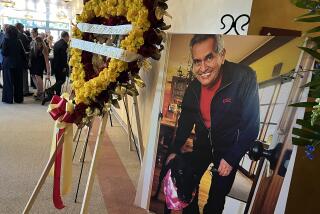A Death in the L.A. Family
- Share via
Los Angeles has suffered a death in the family. Family is an abused word, but it is the only possible metaphor for the set of relationships that this charismatic man created and maintained. Franklin D. Murphy’s people were not a network. Whatever edge of calculation any of them brought into an exchange with him was quickly, mysteriously, caught up in something more exuberant. Los Angeles owes much to that exuberance.
For the family, any of us will do more than for a stranger. Murphy had a God-given knack of capturing that willingness and all but bottling it. “For Franklin,” they would do it--whatever it was and whoever they were--and feel glorious about it not just for the moment but for years afterward.
Dean of the University of Kansas School of Medicine at 32, chancellor of UCLA at 44 (he himself made the acronym official), chairman and CEO of Times Mirror at 52, Murphy could legitimately be called a legend in his own time, for everyone who knew him had a tale to tell about him. These tales continue to be told, and the mood that comes over the tellers is a moral in itself.
What do Murphy’s people remember? They remember a rumpled demeanor, suits more often battered than bespoke, and a voice that could acquire, when necessary, a quarterback’s bark. But more than any of that, they remember an invincible and invigorating confidence. When you were with Murphy, you knew that there was a solution. (You might even be the solution.) For a will like his, there was always a way.
The quarterback and the artist, the scientist and the humanist, the corporate executive and the teacher are not often found to be the same person. Murphy kept these antinomies and others in dynamic resolution.
As the years pass, however, and his memory fades, those who want to know what made his many accomplishments possible should visit the sculpture garden he created at UCLA (the grateful university later named it for him). There they may find that the deepest, most fruitful tension in his character was between contemplation and action, the private and the public. The strong, beautiful works in the garden call the viewer inward. But they stand in a public garden and, as his monument, call the viewer outward to a life lived as his was, to the last moment, with splendid and multiplying energy.
More to Read
Sign up for Essential California
The most important California stories and recommendations in your inbox every morning.
You may occasionally receive promotional content from the Los Angeles Times.













